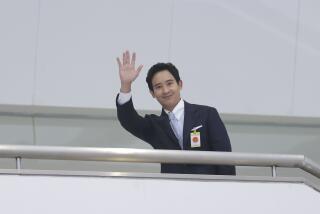Turkey Outlaws Kurds’ Main Party
- Share via
ANKARA, Turkey — Authorities outlawed Turkey’s main Kurdish political movement Thursday, claiming it collaborated with armed Kurdish separatists, and launched proceedings to ban a spinoff party as well.
The crackdown appeared to be a preemptive act against any separatist violence in Turkey in the event of a U.S. invasion of neighboring Iraq. It dealt a blow to the Kurds’ decades-old struggle for ethnic rights -- and, European officials warned, to Turkey’s bid to join the European Union.
A 15-year Kurdish uprising in Turkey ended in 1999 when a few thousand rebels retreated to northern Iraq and declared a cease-fire following the capture of their commander, Abdullah Ocalan. Some rebels have reportedly slipped back across the Cudi Mountains in recent weeks, provoking sporadic clashes in southeastern Turkey’s predominantly Kurdish provinces.
Army and civilian leaders here warn that the separatist campaign in Turkey could erupt in full force if Iraq breaks apart under a U.S. attack, prompting Iraqi Kurds who enjoy de facto autonomy in the north of that country to declare independence.
But the targets of Thursday’s legal action were ethnic Kurdish politicians, who in recent years had shifted from separatist rhetoric to advocacy of linguistic and cultural rights.
Last year, as Turkey sought to qualify for EU membership, it enacted reforms that would allow the country’s 12 million ethnic Kurds to broadcast and teach in their native language for the first time. But bureaucratic obstacles have delayed implementation of the measures.
In a unanimous verdict, the 11-judge Constitutional Court ruled that the People’s Democracy Party, during its six-year existence, had “aided and abetted” Ocalan’s armed Kurdistan Workers Party.
Mustafa Bumin, the court chairman, told reporters that the party had backed terrorism with some of its actions. “We are not only talking about some statements,” he said.
The court banished 46 party members from politics for five years and ordered the party’s assets to be seized.
Later, chief prosecutor Sabih Kanadoglu asked the court to shut down the Democratic People’s Party as well for “becoming a focus for actions” in favor of separatism.
Leaders of the two parties, which enjoy broad support in the Kurdish provinces, denied the charges.
“We have no connection” with the rebels, said Feridun Celik, mayor of Diyarbakir in southeast Turkey, the world’s largest predominantly Kurdish city. He said the court ruled against the party “because of our courage in bringing the Kurdish [rights] question to the agenda. Our struggle was perceived as a threat.”
“We have no idea what to do now,” he said.
Anticipating it would be outlawed, the People’s Democracy Party did not field candidates in national elections in November. Instead, 20 of its members formed a coalition with two other parties to create the Democratic People’s Party. The coalition dominated local races in the southeast and won 6.2% of the nationwide vote.
During the armed Kurdish struggle, which claimed more than 35,000 lives, the Constitutional Court banned three predecessors of the People’s Democracy Party on similar grounds of abetting separatist violence.
Thursday’s action was different because it came in peacetime, a few months after Turkey had lifted emergency rule in the Kurdish provinces and begun amending its laws to fall into line with EU standards. The changes not only would benefit Kurds, but would make it more difficult to ban a political party, censor the media or jail someone for political reasons.
Greece, which holds the rotating presidency of the EU, called the ruling “an especially negative development for the ... consolidation of democratic institutions in Turkey.”
The Bush administration, which is lobbying hard for an agreement to base thousands of Iraq-bound combat troops in Turkey, did not specifically condemn Thursday’s crackdown, although U.S. officials cited general opposition to “the banning of political parties that express their views in a peaceful and democratic manner.”
Thursday’s ruling was a sign that Turkey is bracing for new trouble from Kurds. The government has kept Ocalan, who is serving a life term in prison, isolated from his lawyers since Nov. 27 in an effort to disrupt communication with his fighters, who apparently still obey him.
Some commentators said the Turkish court timed its announcement as a response to a ruling Wednesday by the European Court of Human Rights that Ocalan did not get a fair trial. Turkey disputed the ruling and said it would appeal to a higher chamber of the European court.
Dogu Ergil, a professor of international relations at Ankara University, said the Turkish crackdown, in addition to alienating the country from Europe, might stir up more Kurdish separatist fervor than it prevents.
“These repressive actions will only make Turkey’s Kurds want what their cousins in northern Iraq have -- the right to run their own affairs,” he said.
More to Read
Sign up for Essential California
The most important California stories and recommendations in your inbox every morning.
You may occasionally receive promotional content from the Los Angeles Times.













